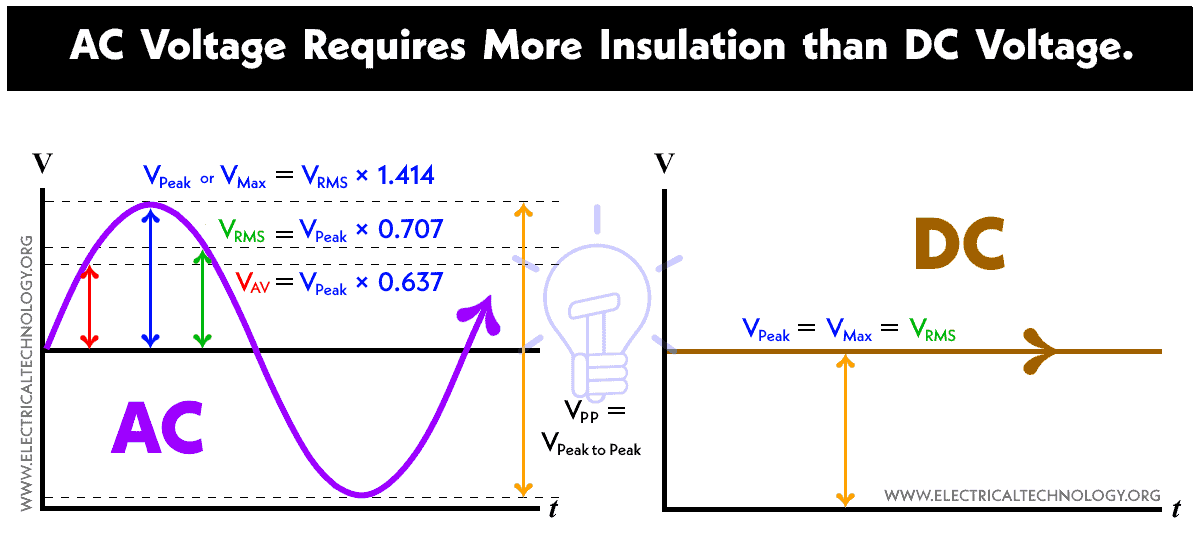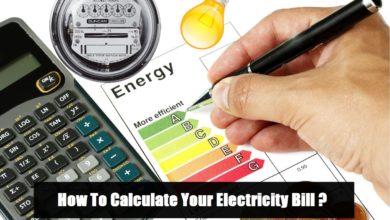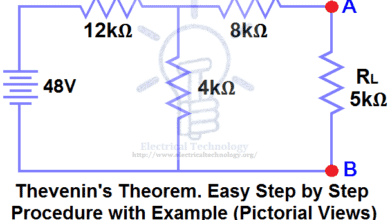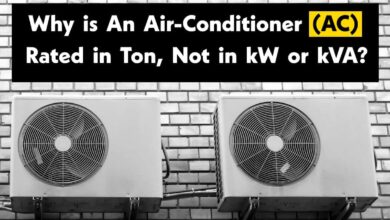Why Does AC Need More Insulation than DC at the Same Voltage Level?
Why Does AC Voltage Require More Insulation than DC Voltage for the Same Working Voltage Level?
For the same working voltage, the potential stress on the insulation is lower in a DC system than in an AC system. Therefore, a DC line requires less insulation.
In other words, a DC system has less potential stress than an AC system for the same voltage level and power rating. This is why an AC system needs more insulation than a DC system.
The typical DC test voltage is approximately 2 to 3 times the AC breakdown voltage. Such high DC voltages are necessary to detect faults within the XLPE insulation. The DC breakdown voltage is significantly higher than the AC breakdown voltage. Therefore, DC voltage tests may be ineffective in detecting serious defects in the cable.
Let’s explain in detail.
When we talk about DC, let’s say 230 Volts DC, it means the maximum value (peak value) of the voltage is 230V. However, when we talk about 230 Volts AC (as in our home distribution system for single-phase AC supply, which is 230 volts AC in many countries following IEC or 120 or 240 volts AC in the US), it refers to the RMS (Root Mean Square) value. In this case, the RMS value of 230 volts AC is √2 times the peak value, which is approximately 230 volts AC.
The peak value of AC voltage is equal to √2 × VRMS = 1.414 × VRMS (where √2 = 1.414)
In other words. The peak value of AC voltage = VRMS ÷ 0.707
Related Posts:
Now, in our case, the peak value of 230V AC = 325V AC peak (calculated as 230V ÷ 0.707 or 230V × 1.414, which equals 325V AC peak.
This means that 230V DC is equivalent to 325V AC peak. This is why AC voltage needs more insulation than DC voltage for the same rating of voltage and power.
Additionally, 230V AC can reach its peak value of 325V peak. This means that 230V AC RMS reaches 325V peak and cycles back to -325V peak in one hertz (Hz) of frequency, where frequency is measured in cycles per second.
That’s why AC needs more insulation than DC.
Click image to enlarge
As shown in the above diagram, the RMS value of AC voltage is below its peak value, and we have to provide insulation for the peak value or maximum voltage, not for the RMS value. In DC systems, the RMS value and peak values of voltages are equal.
Now, you have a clear understanding of the need for more insulation in an AC system compared to a DC system for the same working voltage and power rating.
Moreover, there are additional factors in AC voltage systems, such as the Corona effect, Skin effect, and Ferranti effect which we will discuss in detail in the next posts.
Related Posts:
- What Happens When an AC Line Touches a DC Line?
- Which One Kills – Current or Voltage and Why? Amps vs Volts
- What is the Role of Capacitor in AC and DC Circuit?
- Why Do Electronic Circuits Use DC Current instead of AC?
- What is the Role of Capacitor in AC and DC Circuit?
- Why Can’t We Store AC in Batteries instead of DC?
- Is Lightning AC or DC ?
- Difference between AC and DC Transmission System
- What Happens if a Battery is Connected to the AC Supply?
- Why Do Electronic Circuits Use DC Current instead of AC?
- Why a Transformer Can’t be Operated on DC Supply?
- Difference between AC and DC Resistance & How to calculate it?
- Comparison between AC and DC Transmission System
- Why Do DC Motors Have Higher Starting Torque than AC Motors?
- Differences Between HVAC and HVDC Power Transmission









this is why AC needs more insulation over DC system. I ma clear now. Thanks for sharing
Thanks for taking the time to discuss this, I feel strongly about it and learning more on this topic. If possible, as you gain expertise, would you mind updating your blog with more information? It is extremely helpful for me. Insulation contractors Calgary.
Thanx for Your appreciation. we will do our best. once again thanx
You have added here an interesting question and appreciable answer of it. Thanks for sharing this informative post.
Thanx Dear
So if I need some extra wiring installed with my insulation? do you offer a service where I can get both done?
Great post. I did not know that ac needed more insulation. Thanks
Why the potential stress on the insulation is less in DC plz reply
Great article. Keep up the good work!
Well done (Electrical Technology), but I have here two questions:
1. Why we normally name the 220Vac as an RMS voltage?
2. Why we are using (Root Mean Square of 2), why not 4 or 5 or ….. ?
Thanks
Really awesome! Thanks!
Assalamu alikum brother..i feel so much happy bcoz u r spending ur valubale time for updating these posts..i complited my masters but again in some areas iam so much weak..but by d grace of allah aftr founding ur site most of my doubts r clarified..thanx a lot brother…finally one muslim doing this much good by running this site…keep it up brother…in sha allah i will remember u in my dua always..take care
Thank you so much for appreciation…
Excelente información
Thanks for this interesting information.
Very good explanation . Thank you sir